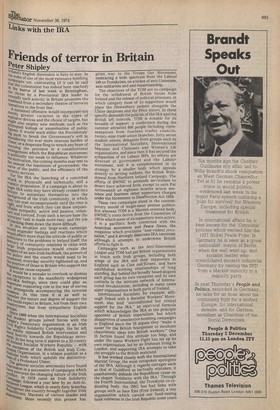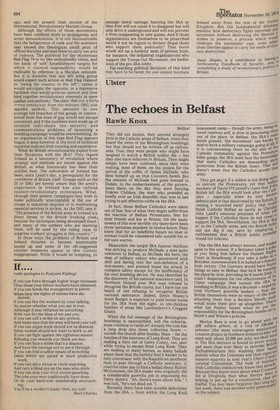Priends of terror in Britain
Peter Shipley
tirneland's English dimension is here to stay. In e e wake of one of the mostextensive bombing triPaigns yet, culminating (if it can be said i at the culmination has indeed been reached) tn, the horror of last week in Birmingham, threat by a Provisional IRA leader to milte,ti,sifY such activity in Britain promotes the almand from a secondary theatre of terrorist .Perations to the front line. rileAr sustained offensive would incorporate not ely greater variation in the types of exPInsive devices and the choice of targets, but might also employ new methods, such as the errIpted kidnap or assassination of public gures. It would mark either the Provisionals' snig Push to break the Government's will in mosuldering the ever more onerous burden of ter, reseor a desperate fling to wreck any hope of ''ng the province in a constitutional arra. is "gement which the Republican movement th Politically too weak to influence. Whatever th"e motivation, the coming months may test to n: utmost the resolution of government, the ,:rve of the public, and the efficiency of the ''curifY services. aj'Qr the IRA the launching of a concerted iS, physically and technically, still a ia'ealistic proposition. If a campaign is about to 8 gin IRA units may have already crossed into to assimilate themselves into the tiaifitgrcund of the Irish community, in which r can wait inconspicuously until the time is ti,rght , and from which they can draw unquan' sYmpathy, active and passive, volunts-"Y and coerced. From such a secure base the o'irrurists' task is made more easy, and the job tracking them down the more difficult. w rs1 this situation any large-scale campaign 1,vo„Ltd engender feelings and reactions which u effect more than the attitude of public or Poli delitic', lans to the problems in Ireland itself: the lat."-acY of community relations in cities with ge Irish populations would create the thprigers of an anti-Irish backlash, the powers of exPolice and the courts would need to be the amined, everyday security tightened up, and Re Position of those in Britain who support the
?tilblican cause exposed.
the Would be a mistake to overlook or dismiss anti_raceptions to the manifestly widespread ininr, A feelings, since they could play an anr lant supporting role in the war of nerves vini,,ProPaganda accompanying the terrorist r.on-nee. At this time it is as well to IRAsider the nature and degree of support the con„c,.°uld expect in Britain, not from their own roups. "'1'Ymen, but from sympathetic English g Sion and e 1969 when the International Socialists 1,e0 student groups joined forces with the Democracy organisation in an Irish has. 'Nights Solidarity Campaign, the far left leastsolidly opposed British intervention and trient heavily towards the Republican moveall_b.',u1 the long term it aspires to a 32-county the 'e'and Socialist Workers Republic — with ranne.Xception of the British and Irish Comstelst Organisation, in a unique position as a rn„rist body which upholds the distinctive
Rof a Protestant Ulster.
exp-ure general socialist sentiments have found hawession in a succession of campaigns which conn',/uirrored the changing nature of the-Irish Call;uct. In 1970 came an Irish Solidarity lern,P4igfl, followed a year later by an Anti-In14011 League, which in nearly forty branches Ite..Pu"ghout the country brought together Irish ariarbli Marxists of various shades and —'ts, More recently this protest has
given way to the Troops Out Movement, embracing a wide spectrum from the Labour left to Trotskyists, on a ticket of anti-Unionism, anti-militarism and anti-bipartisanship. The objectives of the TOM are to campaign for the withdrawal of British forces from Ireland and the release of political prisoners, in which category most of its supporters would place the Shrewsbury pickets alongside the Ulster detainees and the Price sisters. In these specific demands the policies of the IRA and the British left coincide. TOM is notable for its breadth of support: a conference during the summer attracted 600 people including representatives from fourteen trades councils, twenty-nine trade union branches, forty-seven student unions, delegates from groups such as the International Socialists, International Marxists and Claimants and Women's Lib organisations, and since then it has secured the sympathies of six Labour MPs. Its efforts are directed at government and the Labour movement, and it is complemented in its strategy by a smaller body which appeals directly to serving soldiers, the British Withdrawal from Northern Ireland Campaign. The efforts of BWNIC to persuade servicemen to desert have achieved little, except to earn Pat Arrowsmith an eighteen months prison sentence and fourteen other supporters charges under the Incitement to Disaffection Act 1934.
These two campaigns stand in the contemporary mould of single-issue protest politics. But whereas TOM is a Marxist-oriented body, BWNIC's roots derive from the Committee of 100 in which some of its supporters were active; it is a pacifistic body connected with the Anarchist movement and Peace News, the magazine which proclaims "non-violent revolution," and it strongly disavows IRA terrorism although it attempts to undermine British
efforts to fight it. Campaigns such as the Anti-Internment League and TOM had put British organisations in touch with Irish groups, including both wings of the IRA and their supporters in England such as Clan nah'Eirann, and have established working relationships of long standing. But behind the broadly based slogans each group has its own viewpoint and its own contacts in the intricate network of international revolutionism, including in many cases sister organisations in both parts of Ireland. International Socialists, for example, although linked with a Socialist Workers' Movement, also lend "unconditional but critical support for the IRA," an equivocal formula which acknowledges the IRA as the principle opponent of British imperialism, but which disapproves of unselective bombing campaigns in England since the IS argues they "make it easier for the British bourgeoisie to inculcate chauvinistic ideas into British workers." One IS faction found this attitude too limp, and under the name Workers Fight has set up its own organisation, led by an Irishman living in London, and supporting IRA attempts to take the struggle to the British mainland. It has worked closely with the International Marxist Group, the most outspoken apologists of the IRA. Although it regards outrages such as that at Guildford as tactically mistaken, it unashamedly defends the Republican cause on the slogan 'Solidarity with the IRA.' Through the Fourth International, the Trotskyist co-ordinating body, the IMG has had links with groups such as Saor Eire (Free Ireland), a tiny organisation which carried out fund-raising bank robberies in the Irish Republic some years ago, and the present Irish section of the International, Revolutionary Marxist Group.
Although the efforts of these movements have been confined more to propaganda and street demonstrations, it is not inconceivable that the belligerence of rank and file members may exceed the theological small print of official doctrine and lead them to carry out acts of violence. The potential for the mysterious Red Flag 74 or its like undoubtedly exists, and the kinds of 'soft' Establishment targets for which it claimed responsibility would be explicable by reference to a Marxian rationale. But it is doubtful that any left wing group would expect such action as Red Flag claimed to "swing the country to the left"; rather it would anticipate the opposite, in a repressive backlash that would polarise opinion and then bind together revolutionary elements in open conflict with authority. The claim that it is a forty..
What do British revolutionaries expect from their flirtations with the IRA? They regard Ireland as a laboratory of revolution where strategy and methods are tested against the British, at what historically has been their achilles heel. The subversion of Ireland has been, since Lenin's day, a prerequisite for the overthrow of Britain itself. Groups such as the IS or IMG are keenly aware that the army's experience in Ireland has also refined counter-revolutionary techniques. What, through their present campaigns they wish to make politically unacceptable is the use of troops in industrial disputes or in maintaining essential services in strikes. As the IMG sees it: The presence of the British army in Ireland is a direct threat to the British working class, because the techniques being developed there, and many of the soldiers who are learning them, will be used by the ruling class to suppress workers' struggles in this country."
In these ways the problems of Britain and Ireland threaten to become inextricably bound up and some of the oft-suggested counter measures appear in this context inappropriate. While it would be tempting, to
i/assuage moral outrage, banning the IRA or Sinn Fein will not cause it to disappear but will only drive it underground and will not prevent it from reappearing in new guises. And if those organisations are themselves to be proscribed would it not be logical to declare illegal those who support them politically? That move would stir up a hornets' next of protest from, for instance, the industrial organisations who support the Troops Out Movement, the bedfellows of the pro-IRA lobby.
Far-reaching political decisions of this kind may have to be faced, for one cannot incubate
Ireland away from the rest of the United Kingdom. But the fundamental dilemma remains: how democracy fights terrorism and extremism without destroying the liberties it wishes to preserve, a process which would vindicate the extremists' case, even when othwonsedleibsterucietsioanp.pear to carry the seeds of their Peter Shipley is a contributor to Harra0 forthcoming Handbook of Security, and .15 Bcortmtaptnleting a study of revolutionary politics In











































 Previous page
Previous page